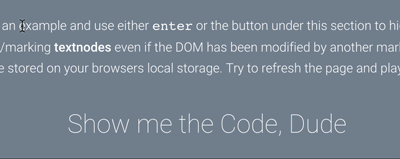marklib
v0.11.0
Published
A simple and fast zero-dependencies-library to transform text-selections into serializable markings.
Downloads
161
Readme
marklib
A simple and fast zero-dependencies-library to transform text-selections into serializable markings.

Install
marklib can be installed with npm or bower.
npm install --save-dev marklib
bower install marklib --save
Usage
Render by selection
// obtain a selection from document
var selection = document.getSelection();
// create a new rendering based on the current document
var renderer = new Marklib.Rendering(document, options, context)
renderer.setId('myRenderId') // if an ID is not provided, a autogenerated one will be used
// renders the given selection and returns a result (`RenderResult`).
var result = renderer.renderWithRange(selection.getRangeAt(0));
Important: After a Rendering has been used to render a selection/serialized result,
it can't be used to render something again. You need to create a new Instance of Rendering.
Options
You can pass options to each rendering instance, the following shows the default options
var renderer = new Marklib.Rendering(document, {
hoverClass: 'marklib--hover',
treeClass: 'marklib--tree',
// Supports arrays and/or strings
className: ['marking']
});
Events
Marklib triggers events that can be listened to with instance.on('event-name'). Events are build with
wolfy87-eventemitter (https://github.com/Olical/EventEmitter). The following Events are available:
Before you can actually receive events, you need to register the event handler with registerEvents (use import { registerEvents } from 'marklib/src/main/RenderingEvents'; on your application bootstrap code.)
| Event-Name | Description | Arguments |
| ------------- |-------------|-------------|
| click | triggered when clicked on a marking. | (originalEvent, instanceHierarchy)
| hover-enter | triggered when a pointer-device starts hovering over a marking | (originalEvent, instanceHierarchy)
| hover-leave | triggered when a pointer-device leaves a marking | (originalEvent, instanceHierarchy)
Additionally, marklib will add hover classes to the current hovered marking.
Constructor Arguments
HTMLDocumentdocument -> the document instance used
Object[options], optional -> an object containing setting for marklib (see Options)
HTMLElement[context], optional -> the context used to serialize / deserialize the rendering, if not given the document instance.
Render by serialized result
A Serialized results consist of 2 strings (start end end) in the following form
'body>section;0;1'`
-▲------------▲-▲
- ▲ The first part defines a css-selector (queryable with document.querySelector).
- ▲ The second part defines the text-node inside the given selector
- ▲ The third part defines the string-offset inside this text-node
Example
// This is the result we get from `RenderResult#serialize()`
var result = {
startContainerPath: 'body>section;0',
endContainerPath: 'body>section;1',
startOffset: 2,
endOffset: 5
}
var rendering = new Marklib.Rendering(document);
rendering.renderWithResult(result);
Use-Cases
- Annotations
- Collaboration tools
- Inline-Commenting (I actually started a project that will do something like this: https://github.com/BowlingX/commentp)
Develop
npm run develop or npm run tdd (to start karma in watch mode)
License
The MIT License (MIT)
Copyright (c) 2015 David Heidrich
Any contribution is welcome, just issue a pull-request or bug/feature if you found something :)

